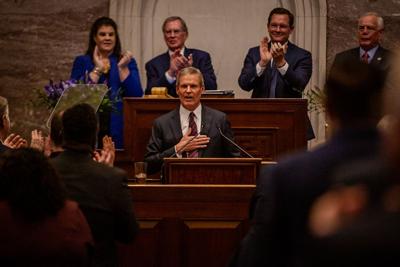
Gov. Bill Lee
The legislation discussed during the special session will have major implications on the state’s budget this year — from the cost of the governor’s education plans to East Tennessee disaster relief funds and even the potential financial implications of any immigration legislation.
As of this writing, those are all unknown factors, though it’s not unusual for details on the state’s budget to be unclear this early in a legislative session. During last year’s session, the state preemptively set aside $144 million in the fiscal year 2025 budget for Gov. Bill Lee’s Education Freedom Scholarship legislation. That money will be returned to the general fund for the fiscal year 2026 budget, so it’s expected that — should the legislation pass this year — lawmakers will utilize those funds for the governor’s school voucher plan.
But those pending large-ticket items are concerning to state Democrats, who would seek to use the state’s revenues in other ways — ways that are unlikely to pass, since Tennessee’s Republican supermajority controls the votes.
In December 2024, the state’s tax revenues were $1.9 billion — $21 million less than in December 2023. Comparing August through December 2024 to the same period during 2023, total tax revenues decreased by 0.18 percent. Tax revenues for those months during 2024 were also considered under the budget estimate.
The state’s revenues are underperforming due to a change to corporate taxes made by the legislature last year. While sales, fuel and other taxes are coming in slightly above estimates, the corporate franchise and excise tax numbers are significantly below estimates, and are down in year-over-year comparison. Franchise and excise tax revenue was down 12.59 percent, or $66.6 million, in December compared to the same month the previous year. And when comparing August through December 2024 to the same months in 2023, that tax revenue was down 24.92 percent, or $364.7 million.
In that same period of comparison, all other tax revenue was up $349.4 million — meaning the $15.3 million in decreased revenues was due to the franchise and excise tax revenue shortfall.
Democrats voice concern regarding unknown franchise tax, school voucher legislation
This decrease was something Democrats warned about when the legislature enacted changes to the franchise tax last year, calling the adjustment a “corporate handout.” Businesses now pay franchise taxes based solely on their net worth, with the amount of property they own in the state no longer a factor. The fiscal year 2025 budget included a $150 million line item to make up for the fiscal year 2024 budget’s undercollection. Now, pretty early in the year, it’s looking like the fiscal year 2026 budget may require a similar item to make up for shortfalls once again.
The state is also eyeing a potential change to its real estate transfer tax this year. Right now, when a home is sold, taxes are collected by the state. But House Bill 95 and Senate Bill 126 would return half of taxes collected to the county in which the property was sold. As it stands now, that legislation is bipartisan and carried by Rep. Johnny Shaw (D-Bolivar) and Sen. Page Walley (R-Savannah) — which is no surprise, considering most legislators would be happy to return tax revenue to their home counties. The legislation is being supported vocally by political and business leaders in Williamson County, the home of Gov. Lee and Senate Majority Leader Jack Johnson (R-Franklin).
That legislation, along with any other bills that have financial effects, will require a fiscal review, and the state will consider any potential decrease in state revenue or cost implications to the fiscal year 2026 budget.
The 114th Tennessee General Assembly will consider education, immigration, guns and health care







